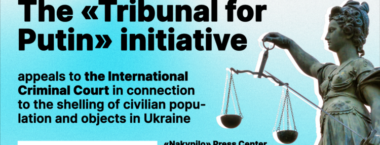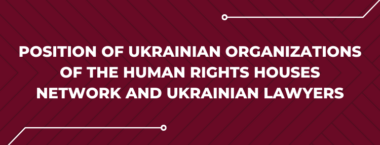Video from the press conference
Statistics shows that 95% judgments of the European Court and about 70% judgments of domestic courts are not satisfied in Ukraine. This means that the right of Ukrainians to a fair trial is permanently violated. Especially if the state is a debtor. Among the reasons for such a situation the human rights activists call: a moratorium on the sale of state enterprises’ assets, the lack of proper control over the execution of the court judgments and the lack of effective judicial protection of property rights.
As early as in 2007 Ukrainians have felt a significant deterioration of the courts’ judgments satisfaction. Since then, the situation is only getting worse. Ukraine ranks third in the number of applications being pending in the European Court of Human Rights. As on December 31, 2013 13,284 applications filed against Ukraine were under consideration at the European Court representing 13.3% of the total number of applications filed to the Court. The largest number of applications against Ukraine, on which the decisions on the merits have been made in 2013, are associated with systemic problem of non-fulfilment (prolonged non-fulfilment of the judgments made by the domestic courts).
According to Maksym Scherbatyuk, the Program Director of the Ukrainian Helsinki Human Rights Union, non-fulfilment of court decisions practically became a national tradition. Especially when it comes to collecting money from the state budget. The procedure for execution of such judicial decisions is usually delayed for years.
Government agencies and officials having lost an action and having the valid court decision and strongly avoiding and delaying its implementation, addressing all possible instances. And even after a final loss they do not want to satisfy the judgment voluntarily. Because of this an obligation to execute the decision rests with the state executive service and consequently the load on each worker is thousands proceedings.
Salary of the bailiff is about 2 thousand UAH. Herewith he/she may be responsible for the court enforcement proceedings requiring collection of millions UAH, or even billions UAH when it goes about the Enforcement Department. And it depends on the efficiency and conscience of a particular government official whether they will be recovered.
As a result the implementation of decisions can be extended for years, and that does not suit either citizens or businesses. But it is for benefit of state enterprises/institutions that have lost an action and do not intend to satisfy the judgments.
Statistics shows that the work of the agencies of the State Enforcement Service is extremely inefficient. Thus, in 2013 more than 8 million of cases for a total amount of 440 billion UAH were pending in the agencies of the State Enforcement Service. The average percentage of recovery makes only 4%, or 20 billion UAH.
One of the striking examples is the case of Mr. Kirichenko on violation of the ownership right to millions UAH and the judgment of the Ukrainian court has not been satisfied for more than 10 years. It should be noted that even a decision of the European Court of Human Rights on the case did not change the situation of the enforcement of the judgment of the national court. For the untimely execution the state should additionally pay a fine in the amount of several millions.
A significant negative fact affecting the enforcement of court decisions in Ukraine is the presence of moratoria on recoveries against property. Thus, the state has extended a moratorium on the bankruptcy proceedings against the enterprises of the fuel and energy complex, which formally allowed such companies not to pay the debts on their obligations, to avoid paying taxes, to distort the competitive environment etc.
So far, despite the requests the government has not provided the Verkhovna Rada with a list of businesses that have such privileges. Therefore, the aforementioned moratorium is working in the informal and manual mode, so to speak, "for friends".
In order to change the situation, human rights activists propose to ensure the existence of effective judicial protection of property rights on a legal basis, including to improve the judicial control over the court rulings enforcement, and also to lift the moratorium on the forced sale of state enterprises’ assets. Moreover they ask to ensure prompt implementation of the Law of Ukraine “On state’s guarantees on execution of courts’ judgments” and allocate sufficient financial resources for its implementation.
“This press release was issued owing to the generous support of the American people provided to the United States Agency for International Development (USAID) under the “Human Rights in Action” Project, which is implemented by the Ukrainian Helsinki Human Rights Union. The Ukrainian Helsinki Human Rights Union bears responsibility for its content and it does not necessarily reflect the views of the USAID or the United States”.
Acting through the USAID the American people provide economic and humanitarian assistance worldwide for nearly 50 years. In Ukraine, the USAID’s assistance is provided in such areas as economic development, democracy and governance, health and social sector. Since 1992, the United States Agency for International Development has provided Ukraine with technical and humanitarian assistance in the amount of $1.8 billion. For more information about the USAID programs in Ukraine please visit its official website http://ukraine.usaid.govand the page in Facebook https://www.facebook.com/USAIDUkraine.



